Curtin College BL1100 Business Law Assignment (Trimester 3, 2018)
VerifiedAdded on 2023/04/20
|5
|1219
|112
Homework Assignment
AI Summary
This assignment solution addresses a Business Law case study, analyzing two key issues: the interpretation of contractual terms, puffs, opinions, and the application of the parole evidence rule, and the identification of relevant contract terms, exclusion clauses, warranties, and conditions. The solution follows a four-step process, applying legal concepts and principles from the Australian legal system, including topics covered in the course materials. The analysis examines the enforceability of agreements, the validity of exclusion clauses, and the consequences of breaching contractual conditions. The assignment references relevant legal principles and case law to support its conclusions, providing a comprehensive understanding of contract law principles.
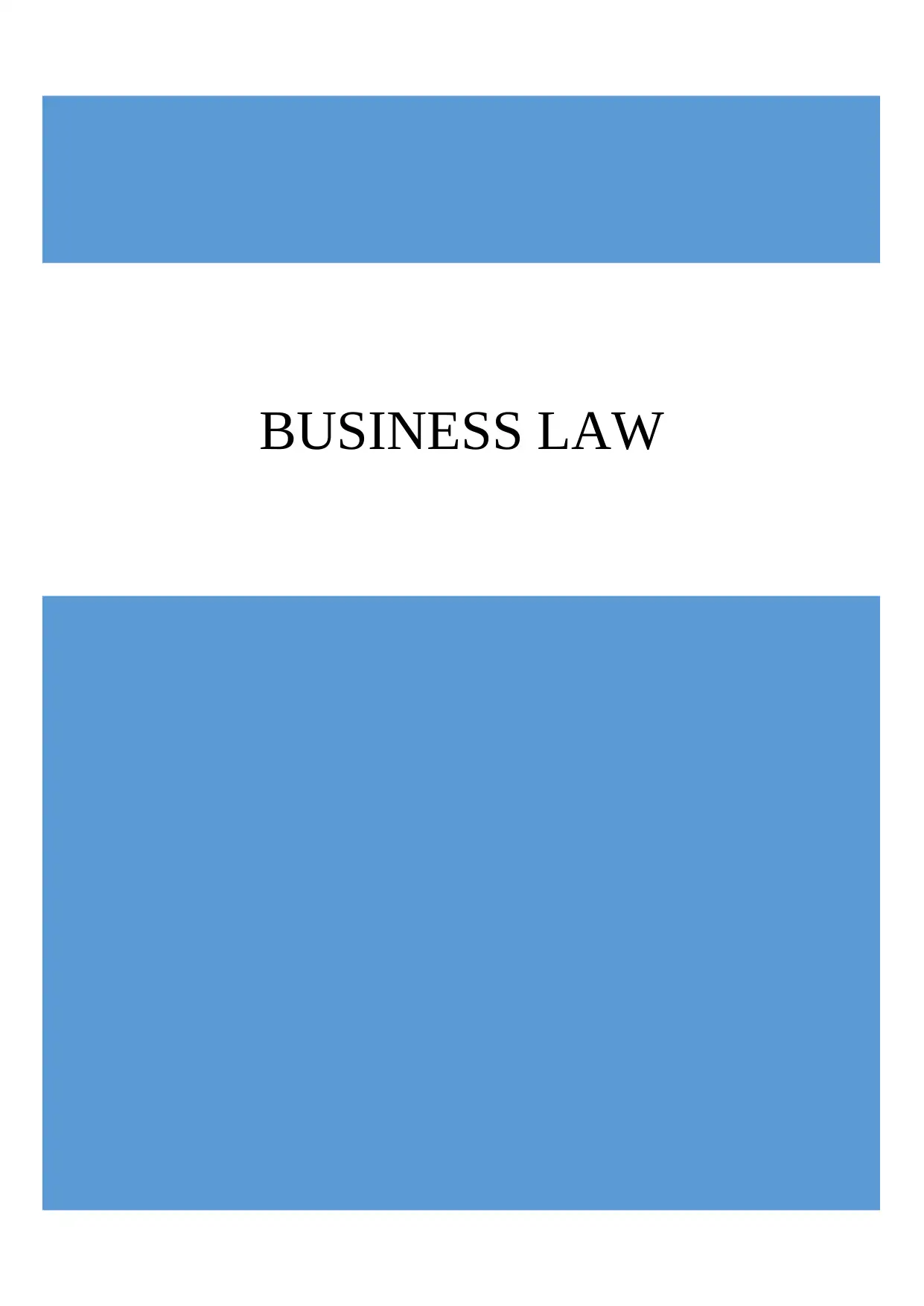
BUSINESS LAW
Paraphrase This Document
Need a fresh take? Get an instant paraphrase of this document with our AI Paraphraser
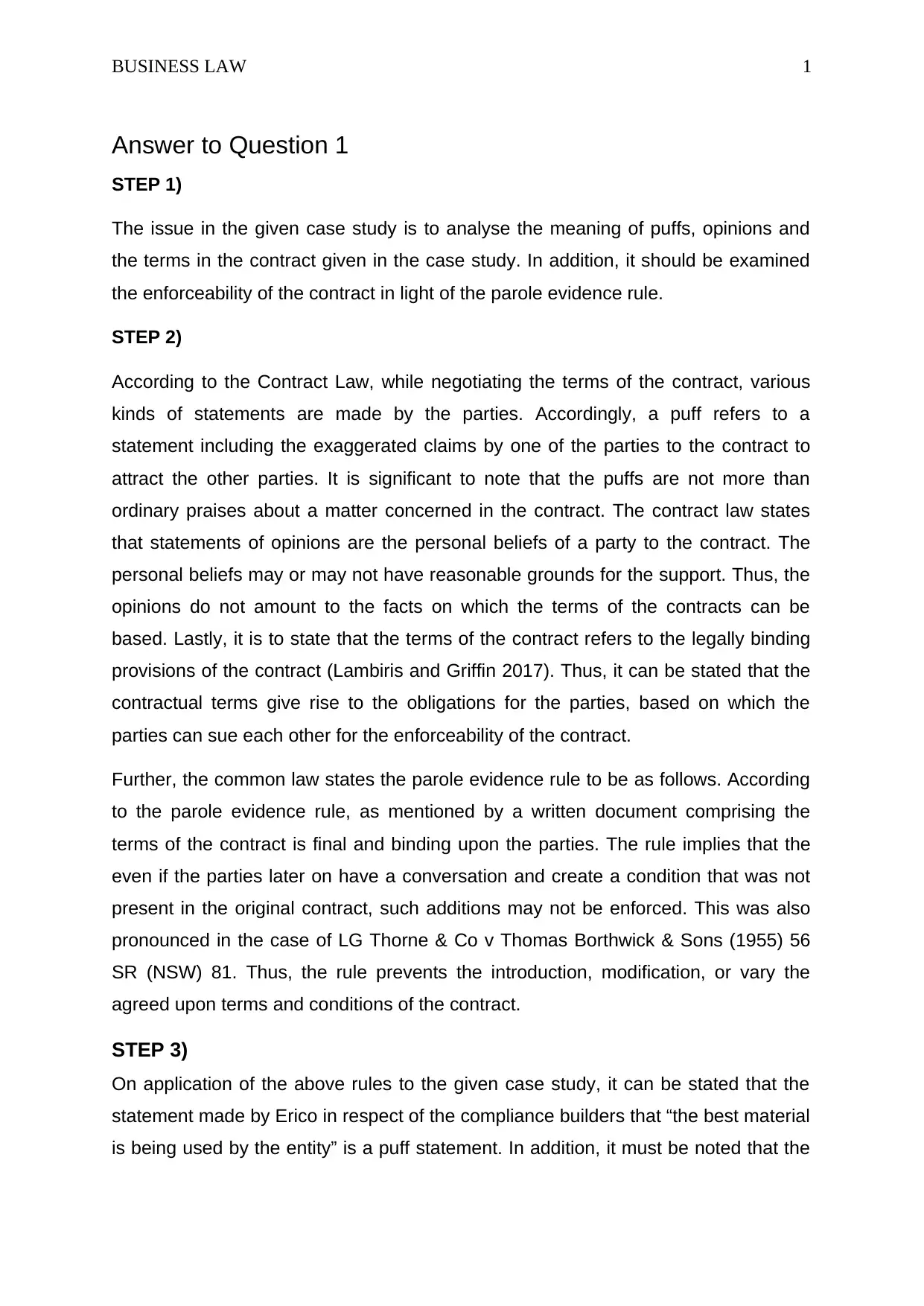
BUSINESS LAW 1
Answer to Question 1
STEP 1)
The issue in the given case study is to analyse the meaning of puffs, opinions and
the terms in the contract given in the case study. In addition, it should be examined
the enforceability of the contract in light of the parole evidence rule.
STEP 2)
According to the Contract Law, while negotiating the terms of the contract, various
kinds of statements are made by the parties. Accordingly, a puff refers to a
statement including the exaggerated claims by one of the parties to the contract to
attract the other parties. It is significant to note that the puffs are not more than
ordinary praises about a matter concerned in the contract. The contract law states
that statements of opinions are the personal beliefs of a party to the contract. The
personal beliefs may or may not have reasonable grounds for the support. Thus, the
opinions do not amount to the facts on which the terms of the contracts can be
based. Lastly, it is to state that the terms of the contract refers to the legally binding
provisions of the contract (Lambiris and Griffin 2017). Thus, it can be stated that the
contractual terms give rise to the obligations for the parties, based on which the
parties can sue each other for the enforceability of the contract.
Further, the common law states the parole evidence rule to be as follows. According
to the parole evidence rule, as mentioned by a written document comprising the
terms of the contract is final and binding upon the parties. The rule implies that the
even if the parties later on have a conversation and create a condition that was not
present in the original contract, such additions may not be enforced. This was also
pronounced in the case of LG Thorne & Co v Thomas Borthwick & Sons (1955) 56
SR (NSW) 81. Thus, the rule prevents the introduction, modification, or vary the
agreed upon terms and conditions of the contract.
STEP 3)
On application of the above rules to the given case study, it can be stated that the
statement made by Erico in respect of the compliance builders that “the best material
is being used by the entity” is a puff statement. In addition, it must be noted that the
Answer to Question 1
STEP 1)
The issue in the given case study is to analyse the meaning of puffs, opinions and
the terms in the contract given in the case study. In addition, it should be examined
the enforceability of the contract in light of the parole evidence rule.
STEP 2)
According to the Contract Law, while negotiating the terms of the contract, various
kinds of statements are made by the parties. Accordingly, a puff refers to a
statement including the exaggerated claims by one of the parties to the contract to
attract the other parties. It is significant to note that the puffs are not more than
ordinary praises about a matter concerned in the contract. The contract law states
that statements of opinions are the personal beliefs of a party to the contract. The
personal beliefs may or may not have reasonable grounds for the support. Thus, the
opinions do not amount to the facts on which the terms of the contracts can be
based. Lastly, it is to state that the terms of the contract refers to the legally binding
provisions of the contract (Lambiris and Griffin 2017). Thus, it can be stated that the
contractual terms give rise to the obligations for the parties, based on which the
parties can sue each other for the enforceability of the contract.
Further, the common law states the parole evidence rule to be as follows. According
to the parole evidence rule, as mentioned by a written document comprising the
terms of the contract is final and binding upon the parties. The rule implies that the
even if the parties later on have a conversation and create a condition that was not
present in the original contract, such additions may not be enforced. This was also
pronounced in the case of LG Thorne & Co v Thomas Borthwick & Sons (1955) 56
SR (NSW) 81. Thus, the rule prevents the introduction, modification, or vary the
agreed upon terms and conditions of the contract.
STEP 3)
On application of the above rules to the given case study, it can be stated that the
statement made by Erico in respect of the compliance builders that “the best material
is being used by the entity” is a puff statement. In addition, it must be noted that the
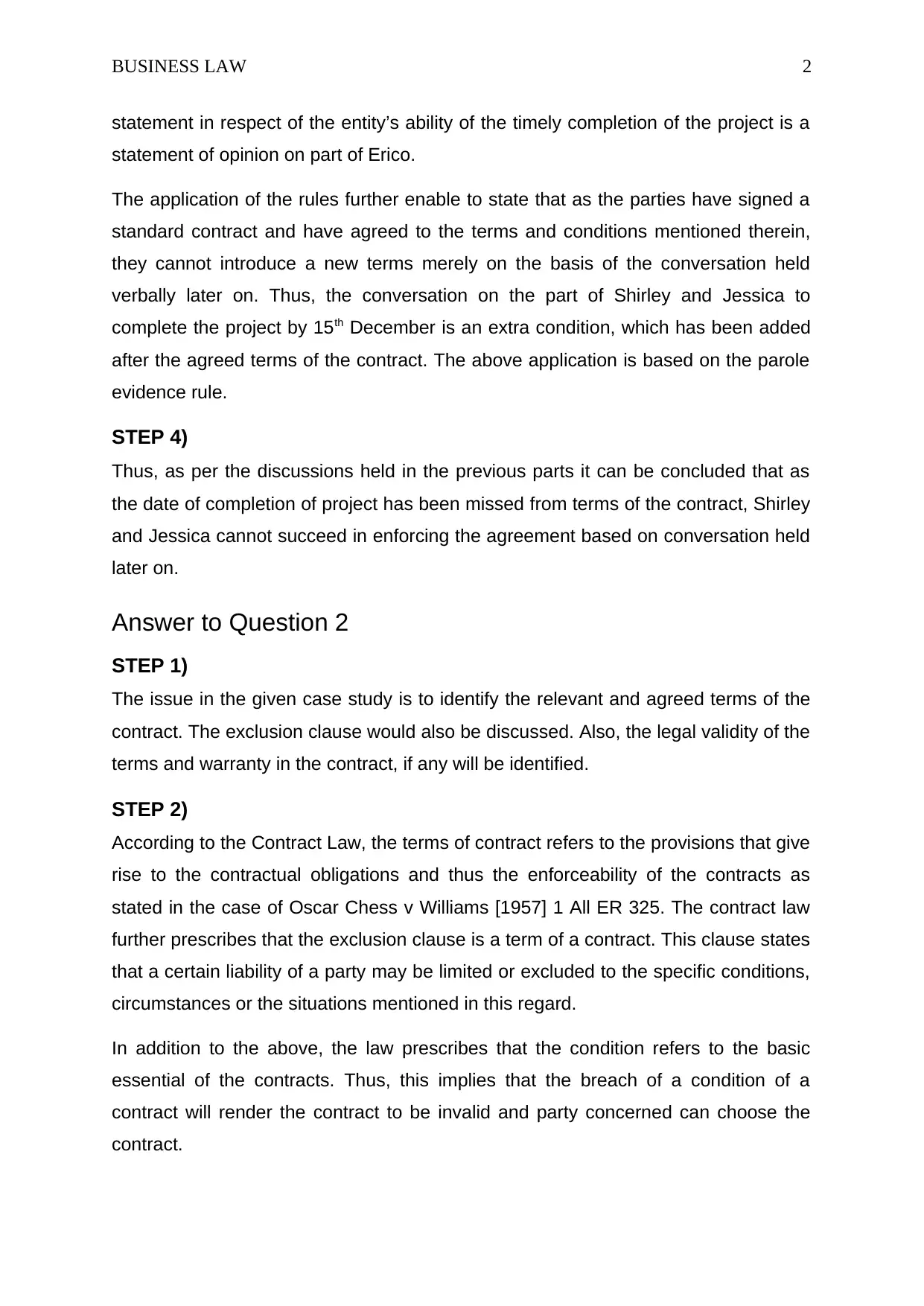
BUSINESS LAW 2
statement in respect of the entity’s ability of the timely completion of the project is a
statement of opinion on part of Erico.
The application of the rules further enable to state that as the parties have signed a
standard contract and have agreed to the terms and conditions mentioned therein,
they cannot introduce a new terms merely on the basis of the conversation held
verbally later on. Thus, the conversation on the part of Shirley and Jessica to
complete the project by 15th December is an extra condition, which has been added
after the agreed terms of the contract. The above application is based on the parole
evidence rule.
STEP 4)
Thus, as per the discussions held in the previous parts it can be concluded that as
the date of completion of project has been missed from terms of the contract, Shirley
and Jessica cannot succeed in enforcing the agreement based on conversation held
later on.
Answer to Question 2
STEP 1)
The issue in the given case study is to identify the relevant and agreed terms of the
contract. The exclusion clause would also be discussed. Also, the legal validity of the
terms and warranty in the contract, if any will be identified.
STEP 2)
According to the Contract Law, the terms of contract refers to the provisions that give
rise to the contractual obligations and thus the enforceability of the contracts as
stated in the case of Oscar Chess v Williams [1957] 1 All ER 325. The contract law
further prescribes that the exclusion clause is a term of a contract. This clause states
that a certain liability of a party may be limited or excluded to the specific conditions,
circumstances or the situations mentioned in this regard.
In addition to the above, the law prescribes that the condition refers to the basic
essential of the contracts. Thus, this implies that the breach of a condition of a
contract will render the contract to be invalid and party concerned can choose the
contract.
statement in respect of the entity’s ability of the timely completion of the project is a
statement of opinion on part of Erico.
The application of the rules further enable to state that as the parties have signed a
standard contract and have agreed to the terms and conditions mentioned therein,
they cannot introduce a new terms merely on the basis of the conversation held
verbally later on. Thus, the conversation on the part of Shirley and Jessica to
complete the project by 15th December is an extra condition, which has been added
after the agreed terms of the contract. The above application is based on the parole
evidence rule.
STEP 4)
Thus, as per the discussions held in the previous parts it can be concluded that as
the date of completion of project has been missed from terms of the contract, Shirley
and Jessica cannot succeed in enforcing the agreement based on conversation held
later on.
Answer to Question 2
STEP 1)
The issue in the given case study is to identify the relevant and agreed terms of the
contract. The exclusion clause would also be discussed. Also, the legal validity of the
terms and warranty in the contract, if any will be identified.
STEP 2)
According to the Contract Law, the terms of contract refers to the provisions that give
rise to the contractual obligations and thus the enforceability of the contracts as
stated in the case of Oscar Chess v Williams [1957] 1 All ER 325. The contract law
further prescribes that the exclusion clause is a term of a contract. This clause states
that a certain liability of a party may be limited or excluded to the specific conditions,
circumstances or the situations mentioned in this regard.
In addition to the above, the law prescribes that the condition refers to the basic
essential of the contracts. Thus, this implies that the breach of a condition of a
contract will render the contract to be invalid and party concerned can choose the
contract.
⊘ This is a preview!⊘
Do you want full access?
Subscribe today to unlock all pages.

Trusted by 1+ million students worldwide
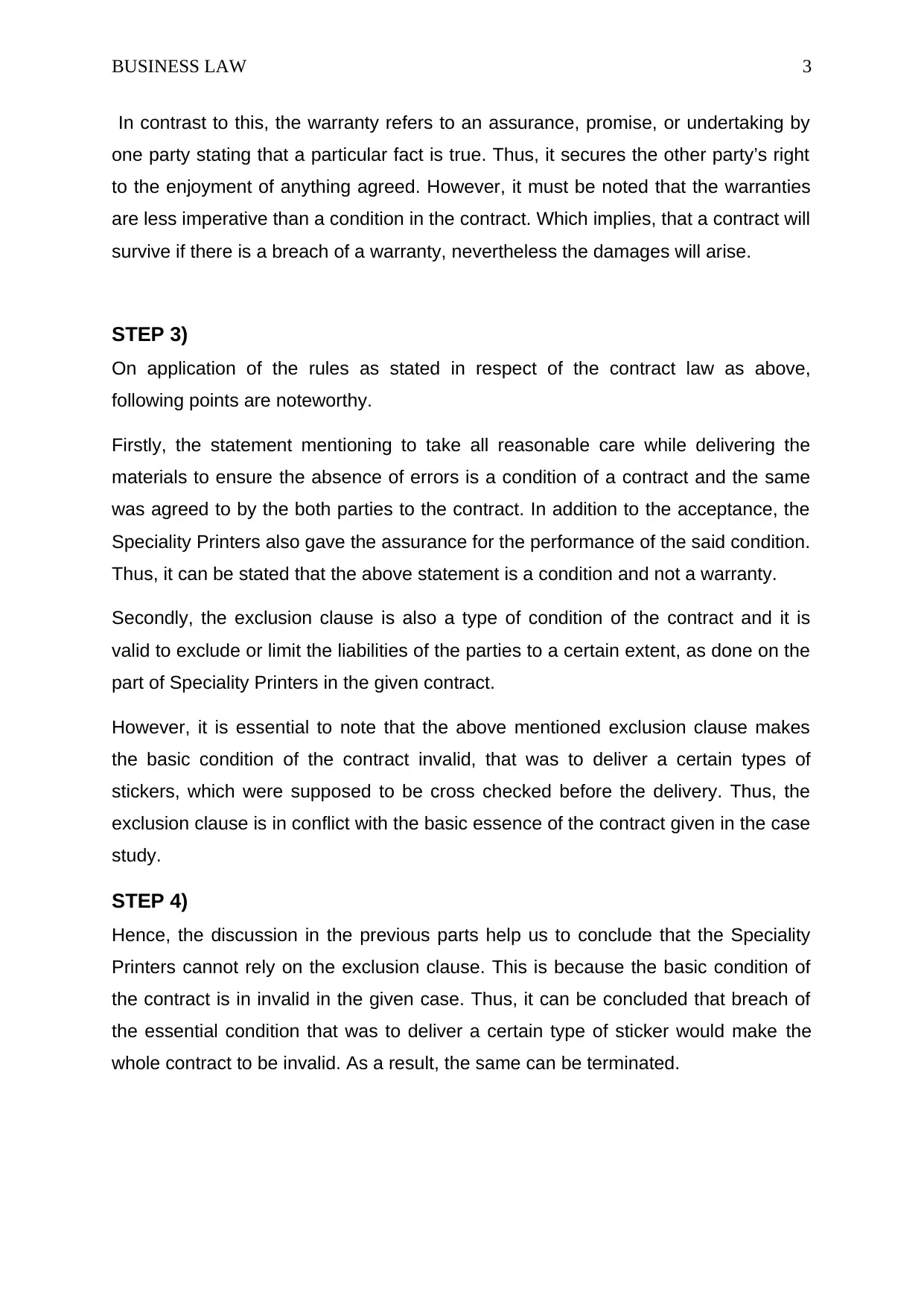
BUSINESS LAW 3
In contrast to this, the warranty refers to an assurance, promise, or undertaking by
one party stating that a particular fact is true. Thus, it secures the other party’s right
to the enjoyment of anything agreed. However, it must be noted that the warranties
are less imperative than a condition in the contract. Which implies, that a contract will
survive if there is a breach of a warranty, nevertheless the damages will arise.
STEP 3)
On application of the rules as stated in respect of the contract law as above,
following points are noteworthy.
Firstly, the statement mentioning to take all reasonable care while delivering the
materials to ensure the absence of errors is a condition of a contract and the same
was agreed to by the both parties to the contract. In addition to the acceptance, the
Speciality Printers also gave the assurance for the performance of the said condition.
Thus, it can be stated that the above statement is a condition and not a warranty.
Secondly, the exclusion clause is also a type of condition of the contract and it is
valid to exclude or limit the liabilities of the parties to a certain extent, as done on the
part of Speciality Printers in the given contract.
However, it is essential to note that the above mentioned exclusion clause makes
the basic condition of the contract invalid, that was to deliver a certain types of
stickers, which were supposed to be cross checked before the delivery. Thus, the
exclusion clause is in conflict with the basic essence of the contract given in the case
study.
STEP 4)
Hence, the discussion in the previous parts help us to conclude that the Speciality
Printers cannot rely on the exclusion clause. This is because the basic condition of
the contract is in invalid in the given case. Thus, it can be concluded that breach of
the essential condition that was to deliver a certain type of sticker would make the
whole contract to be invalid. As a result, the same can be terminated.
In contrast to this, the warranty refers to an assurance, promise, or undertaking by
one party stating that a particular fact is true. Thus, it secures the other party’s right
to the enjoyment of anything agreed. However, it must be noted that the warranties
are less imperative than a condition in the contract. Which implies, that a contract will
survive if there is a breach of a warranty, nevertheless the damages will arise.
STEP 3)
On application of the rules as stated in respect of the contract law as above,
following points are noteworthy.
Firstly, the statement mentioning to take all reasonable care while delivering the
materials to ensure the absence of errors is a condition of a contract and the same
was agreed to by the both parties to the contract. In addition to the acceptance, the
Speciality Printers also gave the assurance for the performance of the said condition.
Thus, it can be stated that the above statement is a condition and not a warranty.
Secondly, the exclusion clause is also a type of condition of the contract and it is
valid to exclude or limit the liabilities of the parties to a certain extent, as done on the
part of Speciality Printers in the given contract.
However, it is essential to note that the above mentioned exclusion clause makes
the basic condition of the contract invalid, that was to deliver a certain types of
stickers, which were supposed to be cross checked before the delivery. Thus, the
exclusion clause is in conflict with the basic essence of the contract given in the case
study.
STEP 4)
Hence, the discussion in the previous parts help us to conclude that the Speciality
Printers cannot rely on the exclusion clause. This is because the basic condition of
the contract is in invalid in the given case. Thus, it can be concluded that breach of
the essential condition that was to deliver a certain type of sticker would make the
whole contract to be invalid. As a result, the same can be terminated.
Paraphrase This Document
Need a fresh take? Get an instant paraphrase of this document with our AI Paraphraser
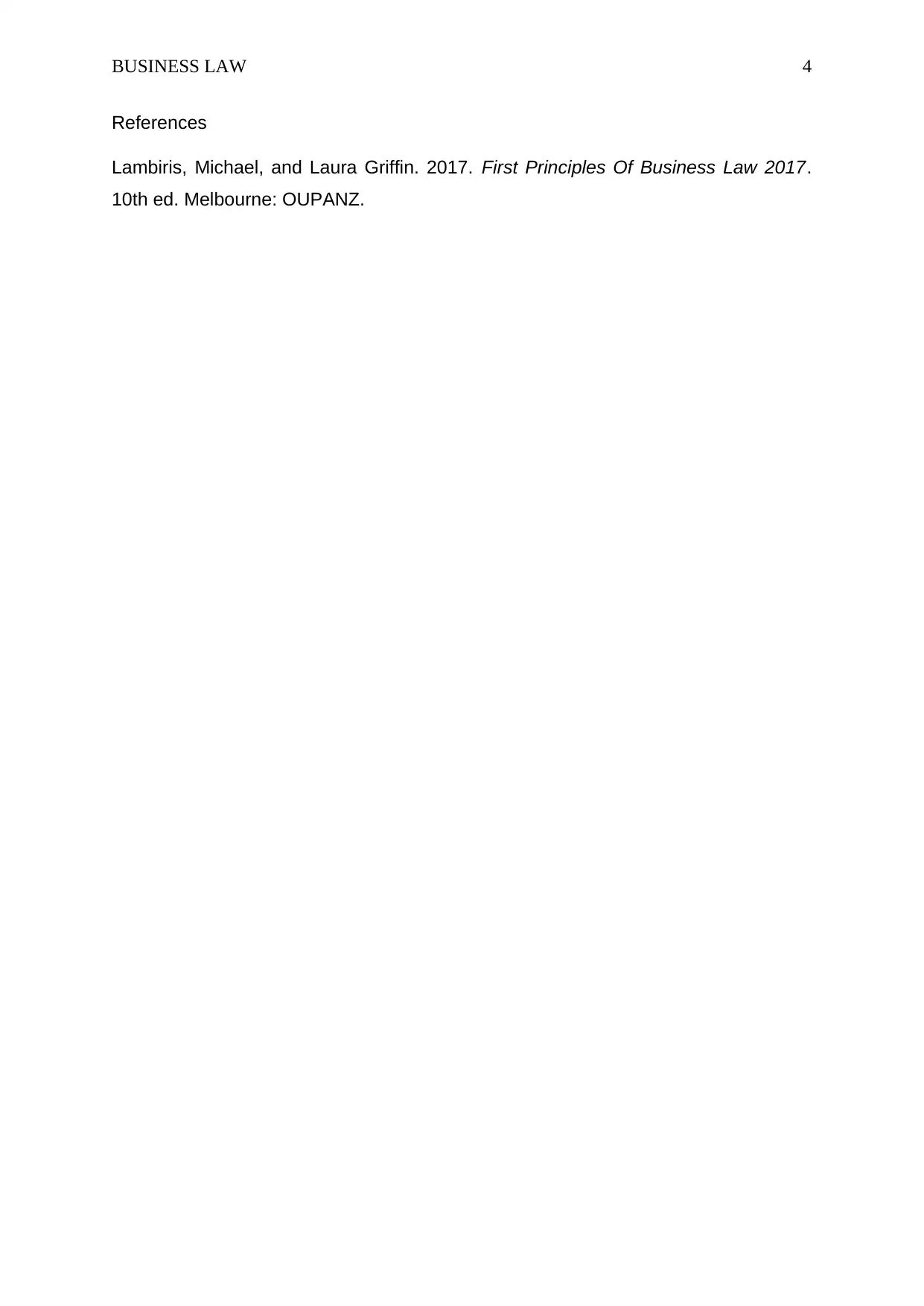
BUSINESS LAW 4
References
Lambiris, Michael, and Laura Griffin. 2017. First Principles Of Business Law 2017.
10th ed. Melbourne: OUPANZ.
References
Lambiris, Michael, and Laura Griffin. 2017. First Principles Of Business Law 2017.
10th ed. Melbourne: OUPANZ.
1 out of 5
Related Documents
Your All-in-One AI-Powered Toolkit for Academic Success.
+13062052269
info@desklib.com
Available 24*7 on WhatsApp / Email
![[object Object]](/_next/static/media/star-bottom.7253800d.svg)
Unlock your academic potential
Copyright © 2020–2026 A2Z Services. All Rights Reserved. Developed and managed by ZUCOL.





